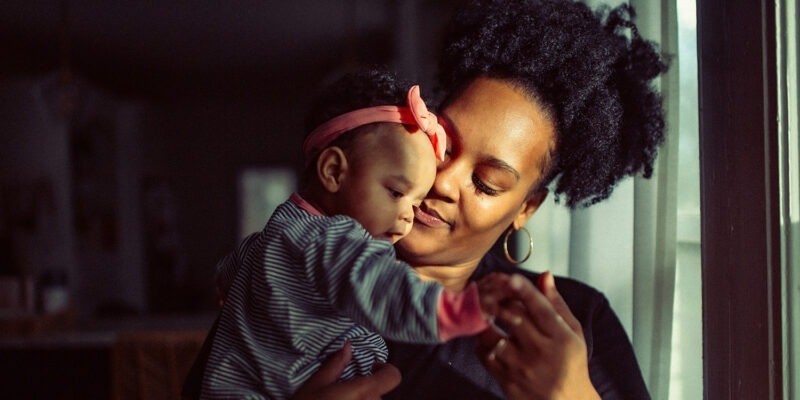This post is also available in: Español (Spanish) Kreyòl (Haitian Creole)
Breastfeeding newborns through their first year gives babies a healthy start in life, while also providing significant benefits to mothers.
Thanks to strong partnerships with WKKF grantees like the Center for Health Equity, Education & Research (CHEER) at Boston Medical Center and Reaching Our Sisters Everywhere (ROSE), Mississippi now ranks second in the nation for the number of hospitals designated Baby-Friendly. This global accreditation recognizes hospitals and birthing centers that excel in infant feeding and mother-baby bonding.
Despite efforts, breastfeeding duration remains low, according to Centers for Disease Control and Prevention (CDC) data. Among infants born in 2019, only 45% of mothers breastfed exclusively for the first three months after birth, dropping to 25% at six months. There are also significant racial disparities, with Black mothers being the least likely to breastfeed immediately after giving birth.
CHEER is actively working to improve breastfeeding practices in birthing hospitals. Leveraging a three-year, $6 million grant from the CDC received in September 2023, CHEER has enrolled 101 hospitals in its Communities and Hospitals Advancing Maternity Practices (CHAMPS National) program.
Breastfeeding rates in the United States declined with the advent of formula and lack of workplace support for nursing mothers. Many mothers today have not witnessed breastfeeding in their families, highlighting a critical need for education and change, according to our partners.
“We are here to buck the system,” said CHEER Director Dr. Anne Merewood, associate professor of Pediatrics at Boston University Chobanian and Avedisian School of Medicine and of Community Health Sciences, Boston University School of Public Health.
The benefits of breastfeeding are extensive. Breastfed babies are less likely to develop illnesses like obesity, diabetes, or asthma, and have lower rates of Sudden Infant Death Syndrome (SIDS). They benefit from their mother’s antibodies, developing stronger immune systems and cognitive abilities.
Mothers also experience health benefits, including lower blood pressure, reduced risk of diabetes, breast or ovarian cancers, and faster post-pregnancy recovery and weight loss.
And perhaps most importantly, breastfeeding helps build a vital bond between mother and child.
CHAMPS aims to transform hospital practices and encourage mothers not only to initiate breastfeeding but to continue exclusively for the first six months, when solid foods are introduced. Success depends on collaborative efforts from organizations like CHEER and ROSE, which focus on normalizing breastfeeding within the Black community to address health disparities.
In Mississippi, ROSE collaborated with hospitals to revise practices that hindered breastfeeding, such as immediate mother-child separation and the provision of free formula. The organization trained staff to support breastfeeding and connected experienced mothers with new mothers seeking guidance.
“This is the opportunity to work with the hospitals, the WIC (Special Supplemental Nutrition Program for Women, Infants, and Children) agencies, the universities and the community,” said Dr. Kimarie Bugg, ROSE’s president and CEO, adding that Jackson State University in Jackson, Miss., a historically Black university and WKKF grantee, has a longstanding relationship with ROSE. “It’s getting all four of those groups out of the silos and pulling them together so they can form relationships.”
These efforts are yielding results.
“I’ve been doing this for over 20 years and so I’ve seen the full gamut of it, and I’m just tickled pink about the changes,” said Tina Fritz, a neonatal nurse and CHAMPS lead at Singing River Hospital in Pascagoula, Miss. “I’m just so happy, and I don’t think we could have done this without CHAMPS.”
When CHAMPS began its work in Mississippi in 2014, no hospitals met the standards for Baby-Friendly hospitals, an accreditation established by the World Health Organization (WHO). Today, Mississippi boasts 22 Baby-Friendly hospitals, encompassing nearly 80% of births statewide. Initial breastfeeding rates among Black mothers have risen from 42% to 63% since 2014.
The Baby-Friendly Hospital Initiative’s 10 Steps to Successful Breastfeeding mandates written policies, trained staff, and practices that prioritize breastfeeding. These include keeping mothers and babies together for at least the first 24 hours and refraining from distributing breastfeeding substitutes.
“There is no way I could have done this without CHAMPS,” said Betsy Dawson, a nurse practitioner and the CHAMPS lead at South Sunflower County Hospital, the second facility to receive the WHO’s designation in the state. “‘Baby-Friendly has a lot of obstacles and a lot of boxes you have to check before they’ll say you’re there.”
ROSE has also launched the “Community Transformers” program, funded by the Kellogg Foundation, training mothers, especially within the Black community, to act as lactation consultants and connect new mothers with resources.
To effect lasting change, advocates stress the importance of community involvement beyond hospital education. Support groups tailored to specific backgrounds can organically boost breastfeeding rates throughout the first year of a child’s life.
“Without bringing the community along as a part of the journey, you’re missing an opportunity,” Bugg said.
Since receiving its CDC grant, CHAMPS has enrolled 101 hospitals nationwide, including in Alabama, Tennessee, and West Virginia.
“The bottom line is these practices are best for moms and babies,” Merewood said. “We need to be nice to people, smile at them, meet them where they are at. With all this emphasis on cost and efficiency in healthcare, we underestimate the value of being kind.”.








Comments